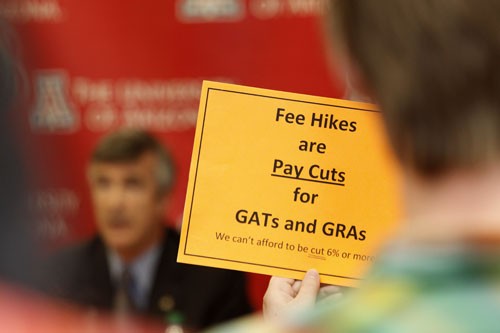UA President Robert Shelton, Associated Students of the University of Arizona President Chris Nagata and Regent Rick Myers gathered with upward of 50 students and community members to hear testimony from across the state regarding the latest tuition and fee increases.
“”No student should be denied access to public education in Arizona because he cannot afford to pay for a gym membership, to pay for organic foods in the student union or to pay for plasma TVs in the library,”” said Connor Mendenhall, an economics senior, in response to mandatory fee increases. “”I urge you to send a message to President Shelton and university administrators by rejecting non-essential, non academic fees … and I urge you to take your obligation seriously to restore the safeguards that once protected students like me from unessential and unnecessary fees.””
The 18th Annual Arizona Board of Regents Tuition Hearing took place from 5 to 7 p.m. in the Harvill building room 211 on Monday. It served as an opportunity for students to address their regents and campus officials about concerns over the increasing cost of education in the state of Arizona.
The public forum was video streamed to each of the three state universities and the surrounding cohort universities including Arizona State University Downtown, ASU Tempe, ASU West, ASU Polytechnic, Northern Arizona University-Yuma, UA South and UA Science and Technology Park.
Throughout the forum, the camera rotated from school to school, giving students at each site an opportunity to speak. Each speaker was given two minutes to offer his or her opinion.
Before students were allowed the chance to speak, Shelton provided a summary of his proposed tuition and mandatory fee increases. More than a week ago Shelton submitted a formal proposal to increase tuition by $1,450 for in-state students. This would bring the total to $7,224 for undergraduates and $8,014 for graduate students.
Shelton proposed a $2,000 increase for non-resident students, bringing the total to $22,983 for undergraduates and $23,376 for graduate students.
He also proposed a $24 sustainability fee, a $306 Campus Health Service and Student Recreation fee and a $335 Library Information fee.
Lon Huber, chairman for the UA Students Advancing Green Energy Fund program for sustainability, and a first year graduate student in the Eller College of Business, was the first UA student to speak. He argued the cost of electricity is becoming a heavy burden for students and the proposed sustainability fee would be used to transform the UA into a “”cutting edge living and learning laboratory.””
Elma Delic, newly appointed chair for the Arizona Students’ Association urged regents to consider the burden the increased tuition and fees will have on struggling Arizona families.
Early in the forum, Nagata asked Shelton and the regents to consider three factors in their decision to increase tuition and fees: affordability, transparency and shared governance. Jonathan Garcia, a pre-law and criminal justice major gave a compelling and teary-eyed speech about the struggles he has faced to stay in school.
“”It’s not easy,”” Garcia said. “”I’m here to represent low income students.””
Garcia said both of his parents are disabled and unable to pay for his education, forcing him to not only find the means to pay for his education but to also help his family survive.
Emily Fritze, ASUA executive vice president told regents the UA “”needs quality that matches what (the students) are willing to pay at this time.””
“”The university is in a tough situation … however, I would like to make the point that as we continue to increase tuition and fees … we are sending the message to the state legislature that they do not have a responsibility to fund higher education in this state,”” Fritze said.
While the overwhelming majority of students asked for tuition and fee decreases, Darian Douglas, a student in the School of Music asked for a fee increase of $300 to pay for tuning and repairs to instruments, current music software, better classroom technology, the hiring of more faculty and new equipment.
“”Listening to music is just as vital as creating it,”” Douglas said.
After the forum, Shelton said he is driven by facts and data but took five pages of notes and plans to look at both before weighing his decision.
“”These are always informative,”” Shelton said in regard to the public hearing. “”I take these seriously.””
To maintain access and quality, the university has to come up with $60 million as a result of state budget cuts to education, he added.
“”Our proposals here get us a little over half way,”” Shelton said. “”The trend is worrisome, I agree (but) I feel we’ve cut as far as we can go.””
The Arizona Board of Regents will host their next meeting at the UA on March 11 to further discuss and vote on tuition and mandatory fee increases.









